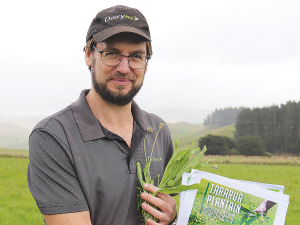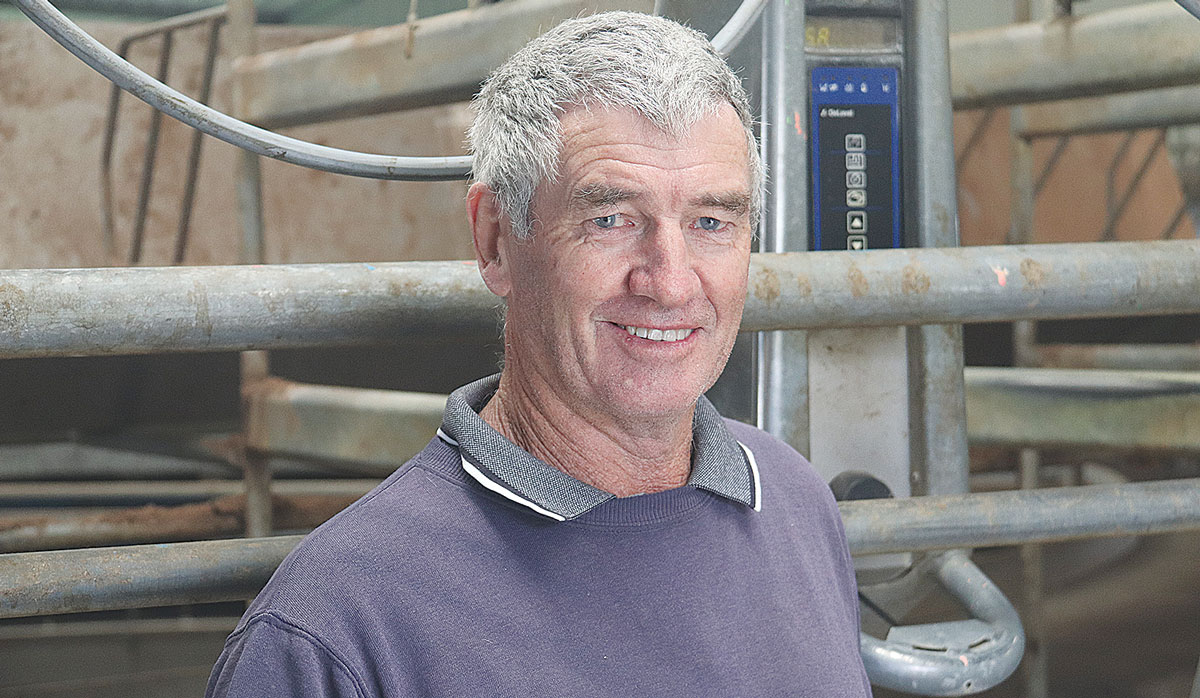State of the Dairy Nation 2024/25: DairyNZ Highlights Record Milk Production and Export Growth
DairyNZ's chief executive Campbell Parker says the 2024/25 dairy season reinforces the importance of the dairy sector to New Zealand.
 DairyNZ's Adam Duker says 66 farmers are directly involved in the project and the push is to double that number.
DairyNZ's Adam Duker says 66 farmers are directly involved in the project and the push is to double that number.
A DairyNZ project helping farmers in the Tararua district, lower North Island, to reduce nitrogen leaching by planting some of their paddocks in plantain is gaining momentum.
Sixty six farmers are directly involved in the project and the push is to double that number.
Recently a series of field days organised by DairyNZ were held to show farmers the results from the project so far and the potential benefits for them if they become involved.
The project started 2017 partly because of Horizons Regional Council's One Plan which showed that unless farmers in Tararua made changes to their farming system, they risked going out of business. As a result of this DairyNZ along with Ministry for Primary Industries (MPI), Agricom, Massey University, AgResearch, Fonterra and Nestle agreed to sponsor the project.
The idea was to find some way of mitigating nitrogen leaching and potentially reducing greenhouse gas emissions without causing a drop in production. The other objective was to demonstrate to the local community that farmers were doing their bit for the environment.
DairyNZ's Adam Duker is leading the project and says plantain was chosen because it seemed to fit well with the predominantly pasture based, low intensity farming systems in the region.
"So we pulled together a working group of rural professionals, scientists and local farmers and worked through all of the farm systems complexities of incorporating plantain. That was over a three year period and we really wanted to have high involvement with those leading farmers who have planting plantain as part of the trial. This enabled us to address some of the challenges and to build a farm systems understanding and a strong research basis," he says.
Duker says they knew from their own research farms and previous research programmes that plantain reduces nitrogen leaching but what they didn't know at that time was how this would fit within a local farm system. He says it was farmers who helped identify the knowledge gaps and together with the working group, solutions were found.
The trials started in 2018 and three years on there is quality data and knowledge available that can now be shared with others - hence the recent field days.
"We are now into the extension phase which is to encourage more farmers to use plantain. There are 265 dairy farmers in the Tararua district, so the more we get involved the greater the catchment effect in terms of environmental improvement," he says.
Duker says farmers can be comforted by the fact that the environmental gains can now be quantified in Overseer and that they have a positive story to tell to their local community about the action they are taking to improve the environment.
"Locals that aren't actively involved with farming don't realise or appreciate the level of environmental change that farmers are making in their day-to-day operations," he says.
Duker says a key objective of the Tararua Plantain Project is to get farmers to a position where they are ahead of the game and are proactive in dealing with environmental issues right across the Tararua catchment.
He says the aim is to continue their extension programme and drive more research and knowledge. There is already interest in the project from other regions and the goal is to share the lessons in Tararua with farmers across the country.
A Farmer's Perspective
One of the first farmers in the Tararua district to become involved in the plantain project is Murray Holdaway on whose farm the field day was held.
He is the 5th generation of his family to run the property. Since he took it ove in 1979, he bought adjacent farms and expanded the original 80 hectare farm to 150 effective hectares, running 445 cows and in 2021 producing 162,988 kgMS. As part of that expansion he built a new dairy shed.
Holdaway is the local president of Federated Farmers and says his interest in the environment began as he started expanding his operation, and with the advent of One Plan. Holdaway says a conversation with a Horizons advisor prompted him think more about the environment.
 |
|---|
|
Farmer Murray Holdaway says one of the reasons that some farmers are doing nothing is there are still no silver bullets available to deal with nitrate leaching and GHG emissions. |
"This made me aware of the environmental footprint that we as dairy farmers were having and ever since then every decision we have made on the farm has got an environmental component to it. We have done all sorts of things, such as establishing our eco-irrigation system.
"We have closed down one creek crossing and bridged another and fenced all our waterways. With the new shed we reticulate some of the water. There are so many little things we do just on daily basis and it's now part of our thinking," he says.
His inital foray into plantain began long before the start of the project he's now part of. For him it was looking at feed quality and getting greater persistence in the pasture. But he says it wasn't until later that the environmental benefits of plantain came on the radar.
Holdaway was part of that small group of farming leaders in the Tararua District selected to be part of the trial. He says they canvassed many options, but it was then-DairyNZ scientist Dr Rick Pridmore who suggested that plantain could be an option, as well as a way of demonstrating to the community they were proactive about the environment.
Since then, Holdaway's property has become one of the monitor farms where trials have been run and some of the scientific data gathered.
"It's certainly a benefit but it's not clear to say that it's been a profitable project or not. But what it does is, it satisfies my doing something about the environmental footprint without costing me production, so that's the benefit. We can put the figures through Overseer and in theory it's going to show less leaching, and we can also measure the water quality.
"What I can say is that I am doing something to mitigate the footprint we have," he says.
Holdaway says one of the reasons that some farmers are doing nothing is there are still no silver bullets available to deal with nitrate leaching and GHG emissions. He says he detects a positive shift in community attitudes towards farmers, but more needs to be done in this project to instil this message.
"I think we are well past the era when farmers were seen as nothing more than environmental laggards. I am proud to be a dairy farmer and when I go into town I make a point of saying what I do and what I am doing for the rest of the community. This is part of what the plantain project is about - showing the community the positive side of dairy farming."
The 5+ A Day Charitable Trust has launched a collection of affordable recipes designed to turn everyday vegetables into seasonal stars.
Jane Mellsopp has been confirmed as the new Government Appointee to the New Zealand Meat Board (NZMB).
To celebrate the tenth anniversary of its annual Good Deeds competition, Rabobank will give away $100,000 to improve rural community hubs, schools, clubrooms, and marae across New Zealand.
Agricultural and veterinary product supplier Shoof International has appointed Michaela Dumper as its new chief executive.
Federated Farmers is celebrating following the Government's announcement that young farmers will be able to use their KiwiSaver funds to buy their first home or farm.
The Meat Industry Association of New Zealand (MIA) today announced that Chief Executive Officer Sirma Karapeeva has resigned from the role.
OPINION: Staying with politics, with less than nine months to go before the general elections, there’s confusion in the Labour…
OPINION: Winston Peters' tirade against the free trade deal stitched with India may not be all political posturing by the…